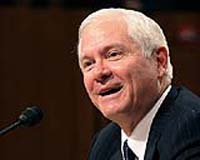 |
Washington (UPI) Oct 20, 2009 All it took was a simple statement to resolve a huge controversy over a well-meaning $7.5 billion U.S. aid package to Pakistan and avert what could have become a major issue in U.S.-Pakistan relations at a time when neither country can afford it. The controversy grew from claims in some Pakistani quarters that the aid package, known as the Kerry-Lugar-Berman bill, was designed to micromanage Pakistan's internal affairs and impinge on its sovereignty. The powerful Pakistani military establishment expressed strong reservations despite assurances by the government of President Asif Ali Zardari that it was a "pro-democracy aid package." The opposition to the measure grew so intense in Pakistan that the Zardari government, hobbled by a severe economic crisis and bled white by exploding Islamist violence, was forced to send back its Foreign Minister Shah Mehmood Qureshi to Washington in a hurry to salvage the package. It was during talks with Qureshi that the measure's principal backers, Sen. John Kerry, D-Mass., and Rep. Howard Berman, D-Calif., decided to issue a statement to clarify the intent of the measure. A day later, U.S. President Barack Obama signed the bill into law, designated as the Enhanced Partnership with Pakistan Act of 2009. The aid package, the money for which must be appropriated by Congress every year, would triple non-military U.S. aid to Pakistan at the rate of $1.5 billion a year for five years. The intent behind the measure is to help strengthen Pakistan's democratic institutions, promote human rights, make its military answerable to the civilian government and bring economic relief to the suffering masses. The provisions in the aid package include requiring the U.S. secretary of state to periodically certify the exercise of civilian control of the military to curb any cross-border activities of terror outfits operating from its territory. The Kerry-Berman statement will be placed in the Congressional Record along with the aid package bill, but the bill itself will remain unchanged, the Voice of America reported. Qureshi said he hoped that the furor in Pakistan over the aid package would ease after the release of the U.S. lawmakers' statement, which he described as "historic" and promised to tell his people that the aid package is a sign of U.S. friendship. In issuing the written statement, Kerry told reporters that the bill "demonstrates the American people have a long-term commitment to the people of Pakistan," CNN reported. "The many requirements of this report are intended as a way for Congress to assess how effectively U.S. funds are being spent, shortfalls in U.S. resources that hinder the use of such funds and steps the government of Pakistan has taken to advance our mutual interests in countering extremism and nuclear proliferation and strengthening democratic institutions," the statement said. "There is no intent to (establish), and nothing in this act in any way suggests that there should be, any U.S. role in micromanaging internal Pakistani affairs, including the promotion of Pakistani military officers or the internal operations of the Pakistani military." Praising the aid package, a White House statement said the law "is the tangible manifestation of broad support for Pakistan" in the United States and is "based on a shared commitment to improving the living conditions of the people of Pakistan through sustainable economic development, strengthening democracy and the rule of law, and combating the extremism that threatens Pakistan and the United States." The resolution of the aid package issue, assuming no new one emerges, also helps the United States as it can use all the support it can get from Pakistan in fighting the terror groups holed up in sanctuaries in the tribal regions along the Afghanistan-Pakistan border. The Pakistan factor also cannot be ignored in any new strategy that emerges from the Afghan war council meetings within the Obama administration. Even as the aid package was being signed into law, Pakistan convulsed under a series of brutal and daring militant attacks, mostly on security installations, that killed scores of people. During the weekend, the long-awaited ground assault by the Pakistani military against the Taliban, al-Qaida and other Islamist groups in South Waziristan began, with reports of heavy militant casualties. Share This Article With Planet Earth
Related Links News From Across The Stans
 US troop move may come without Afghan 'legitimacy': Gates
US troop move may come without Afghan 'legitimacy': GatesAboard A Us Military Aircraft (AFP) Oct 20, 2009 President Barack Obama may have to make a decision on whether to send more US troops to Afghanistan even if the "legitimacy" of the Afghan government remains in doubt, Defense Secretary Robert Gates said Tuesday. Gates told reporters aboard his plane that a decision on strategy and troop levels might have to be taken before the outcome of disputed Afghan elections is fully resolved. ... read more |
|
| The content herein, unless otherwise known to be public domain, are Copyright 1995-2009 - SpaceDaily. AFP and UPI Wire Stories are copyright Agence France-Presse and United Press International. ESA Portal Reports are copyright European Space Agency. All NASA sourced material is public domain. Additional copyrights may apply in whole or part to other bona fide parties. Advertising does not imply endorsement,agreement or approval of any opinions, statements or information provided by SpaceDaily on any Web page published or hosted by SpaceDaily. Privacy Statement |